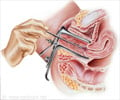A study has shown that the chances of abnormal mammograms and breast biopsies are greater when combined hormone therapy.
A study has shown that the chances of abnormal mammograms and breast biopsies are greater when combined hormone therapy is used and this might decrease the effectiveness of using these methods for detecting breast cancer.
For the study, Rowan T. Chlebowski, M.D., Ph.D., of the Los Angeles Biomedical Research Institute at Harbor–UCLA Medical Center, and colleagues examined 16,608 post-menopausal women who participated in the Women’s Health Initiative (WHI) clinical trial, beginning in 1993 through 1998.They randomly assigned a total of 8,506 women to receive a combination of estrogen plus progesterone while 8,102 took a placebo.
Each woman received a mammogram and breast examination yearly, with biopsies performed based on physicians’ clinical judgment.
The researchers found that during the 5.6 years of the study, 199 women in the combined hormone group and 150 women in the placebo group developed breast cancer.
They further noted that mammograms with abnormal results were more common among women taking hormones than among women taking placebo, women taking hormones had a 4 percent higher risk of having a mammogram with abnormalities after one year and an 11 percent greater risk after five years.
The researchers also found that breast biopsies were more common among women taking hormones than among those assigned to placebo.
Advertisement
“After discontinuation of combined hormone therapy, its adverse effect on mammograms modulated but remained significantly different from that of placebo for at least 12 months,” they added.
Advertisement
However, breast density was not measured in the study.
“Use of conjugated equine estrogens plus medroxyprogesterone acetate for approximately five years resulted in more than one in 10 and one in 25 women having otherwise avoidable mammogram abnormalities and breast biopsies, respectively, and compromised the diagnostic performance of both,” the researchers said.
“This adverse effect on breast cancer detection should be incorporated into risk-benefit discussions with women considering even short-term combined hormone therapy,” they added.
The study is published in the February 25 issue of Archives of Internal Medicine, one of the JAMA/Archives journals.
Source-ANI
KAV/K











